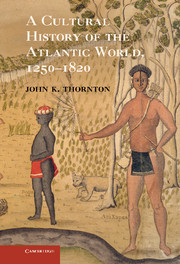1 - The Formation of the Atlantic World, 1250–1600
Published online by Cambridge University Press: 05 November 2012
Summary
Mastering the Atlantic
It is easy to forget in the age of motorized travel that before the middle of the nineteenth century, the easiest, fastest, and cheapest way to move cargo of any significant size and people in any numbers was by water. Only extraordinary effort with horses and draught animals could move goods faster, and then only at considerably more expense. This simple fact goes a long way to explaining why river and sea travel was so important, and why humans worked hard to master maritime and nautical technology.
Given this fact, it may seem extraordinary that the Atlantic Basin was the last large body of water to be mastered for navigation. The vast Pacific was being crossed by Polynesians in increasingly more elaborate watercraft from the time of Christ, following remarkable breakthroughs in oceanic navigation and watercraft construction. The Indian Ocean was crisscrossed with trading boats long before the Common Era began, as the Periplus of the Erythrean Sea, a guide to navigation of the first century, shows. Ancient navigators voyaged into the Mediterranean even before historical records marked their journeys, and Europe’s northern seas saw ports and trade long before the Romans conquered Gaul.
- Type
- Chapter
- Information
- A Cultural History of the Atlantic World, 1250–1820 , pp. 7 - 28Publisher: Cambridge University PressPrint publication year: 2012

